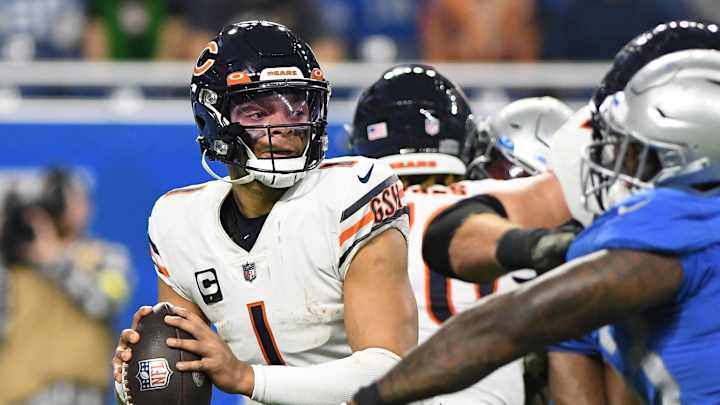Conversion Plan for Justin Fields

In this story:
The development of Justin Fields is going to take a trade-off from the Bears, not to mention their fans.
Whether everyone is ready for it remains to be seen, and this includes the Bears themselves.
Last year the offense rolled up the most rushing yards in franchise history, which is no small accomplishment considering who carried the ball for them from the mid-1970s through mid-1980s.
Fields ran for 1,143 more yards, 723 more than in his rookie year for five more starts and three more games.
The Trade-Off
Now coach Matt Eberflus is sounding a bit like Matt Nagy with Mitchell Trubisky in their former QB's second year within that team's offense. Nagy wanted Trubisky staying behind the line and finding receivers instead of taking off with the ball. It never worked. Trubisky seemed hesitant and confused and never could get the ball downfield well anyway.
Eberflus knows Fields has an accurate arm when throwing downfield. He'd like to see the arm used rather than seeing his QB put everything on his legs.
"You know, run it when we need," Eberflus said. "When we're down in the red zone, third down, we might need it at that point during those critical situations of the game.
"So that's what he's going to do."
The Bears feel the offense should progress naturally and require less of Fields bailing them out with big runs like the long TD runs last year. Their logic is good. Running quarterbacks tend to absorb too much punishment. Fields missed two games and played hurt through several games last year, and did this his rookie year, too.
A conversion of this type depends on two things, however.
The first is that they can actually run the ball themselves without leaning as much on the quarterback running it. NFLGSIS tracked Fields at 670 scramble yards and 473 planned rushing yards.
The Bears had 3,014 yards rushing and if you simply put Fields back down at the 420 yards rushing he had as a rookie, they drop as a team to about ninth in the league in rushing yards rather than first. So where does the yardage come from and more importantly the points?
They're going to need rushing yards in a more conventional way, leaning on their new stable of running backs and on offensive coordinator Chris Morgan to get the offensive line working consistently in the wide zone scheme.
"It's just about working their schemes, you know?" Eberflus said. "I think having the halfbacks we have, I feel confident about those guys. We feel good about our offensive line, you know, what we've done there in terms of the run blocking.
"We certainly value C-Mo (Morgan) and the way he schemes it up every single week and changed it up the way he does. But we certainly feel good about it."
Conventional Bears Offense
The other way you make up for that is the way every normal NFL team does it and this is from Fields' passing in rhythm. He needs to advance as a passer—at reading it, getting rid of the ball and finding the better assortment of targets he has at his disposal.
During OTA work, the Bears say they see this happening.
"I think it is detectable when you're out there," Eberflus said. "You can see him going through his reads quicker reading the coverages on the snap and processing and where to go with the football. And again he's been working with his footwork and his release. He's been doing a great job with all of those things and we're excited with where he is right now."
Bears defensive coordinator Alan Williams sees Fields' mental processing with the offense as quicker in practice since last year as he tries to defeat the secondary.
"I see good decision-making—that's what you want in your quarterback," Williams said. "I see improved accuracy. That's what you want in your quarterback. And how fast he's processing. That's also the, in my mind, what you want in your quarterback.
"So from Day 1 last year to right now? From my standpoint, and I'm not a quarterback guru whatsoever, but I see how he has grown from last year to this year and practice by practice by practice, he's growing. So you have to be encouraged when you see those things."
Eberflus agrees that some of the improvement is only natural because this is Fields' second year in the offense.
"I think some of it expected just from the experience of last year but I would say this—that no one has worked harder than him in this offseason," Eberflus said. "Starting in February, you know, he's been working on his own, studying different quarterbacks and really understanding of what he needed to improve on, you know, getting from the coaches from (QB coach Andrew) Janocko and (offensive coordinator) Luke (Getsy) and myself. And he's worked his tail off from that point."
The Bears see Justin Fields' offense being something they plan for this year less than they see it the result of his natural speed as a runner.
Considering the attempts made to surround him with offense, this is as it should be. The degree to which they are able to convert their attack to one less dependent on Fields' running will be all on Fields' mind and arm.
In the long run, success depends on this and so does Fields' longevity.
Twitter: BearDigest@BearsOnMaven

Gene Chamberlain has covered the Chicago Bears full time as a beat writer since 1994 and prior to this on a part-time basis for 10 years. He covered the Bears as a beat writer for Suburban Chicago Newspapers, the Daily Southtown, Copley News Service and has been a contributor for the Daily Herald, the Associated Press, Bear Report, CBS Sports.com and The Sporting News. He also has worked a prep sports writer for Tribune Newspapers and Sun-Times newspapers.